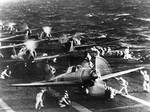D3A
| Country | Japan |
| Manufacturer | Aichi Kokuki KK |
| Primary Role | Dive Bomber |
| Maiden Flight | 1 January 1938 |
Contributor: C. Peter Chen
ww2dbaseThe D3A Navy Type 99 dive bombers were introduced to the Japanese Navy admirals in Dec 1937 after a request for such an attack aircraft in the summer of 1936. The initial tests done in Jan 1938 were rather disappointing; naval experts deemed the aircraft underpowered and unstable. It took a modification in the design for the D3A to barely win the contract over competitor Nakajima's D3N. The first major combat the D3As saw was no other than the Pearl Harbor attack that started the Pacific War. Through the successful Japanese conquest of the Pacific Ocean in the following six months, D3A dive bombers, by now code named Val by Allied airmen, became among the most dreaded sights for opposing sailors. During the Indian Ocean Raid of Apr 1942 for example, 80% of the bombload dropped by D3As against British cruisers Cornwall and Dorsetshire and carrier Hermes found their targets, causing devastation. In Jun 1942, D3As were produced with a more powerful engine, adding more power but reducing range, so many of them began carrying additional fuel tanks to make up for the difference. Later on in the war, Yokosuka D4Y Suisei dive bombers replaced them as the standard dive bombers of the Navy, and many D3As were transferred onto smaller carriers, to land-based units, or back to Japan as trainers. Some of these aircraft saw one last mission as kamikaze in the final year of the war.
ww2dbaseSource: Wikipedia.
Last Major Revision: Oct 2006
D3A Timeline
| 7 Dec 1941 | Destroyer USS Helm patrolling off Honolulu harbor was straddled by two 100-pound bombs dropped from an Aichi D3A1 'Val' bomber that caused minor structural damage. |
SPECIFICATIONS
D3A1
| Machinery | One Mitsubishi Kinsei 3 14-cylinder air-cooled radial engine rated at 840hp2x |
| Armament | 3x7.7mm Type 97 machine guns, 1x250kg bomb, 2x60kg bombs |
| Crew | 2 |
| Span | 14.37 m |
| Length | 10.20 m |
| Height | 3.85 m |
| Wing Area | 34.90 m² |
| Weight, Empty | 2,408 kg |
| Weight, Loaded | 3,650 kg |
| Speed, Maximum | 387 km/h |
| Speed, Cruising | 296 km/h |
| Service Ceiling | 9,300 m |
| Range, Normal | 1,472 km |
D3A2
| Machinery | One Mitsubishi Kinsei 54 14-cylinder air-cooled radial engine rated at 1,300hp |
| Armament | 3x7.7mm Type 97 machine guns, 1x250kg bomb, 2x60kg bombs |
| Crew | 2 |
| Span | 14.37 m |
| Length | 10.20 m |
| Height | 3.85 m |
| Wing Area | 34.90 m² |
| Weight, Empty | 2,570 kg |
| Weight, Loaded | 3,800 kg |
| Speed, Maximum | 430 km/h |
| Speed, Cruising | 296 km/h |
| Rate of Climb | 8.62 m/s |
| Service Ceiling | 10,500 m |
| Range, Normal | 1,352 km |
Photographs
 |  |  |  |
Please consider supporting us on Patreon. Even $1 per month will go a long way! Thank you. Please help us spread the word: Stay updated with WW2DB: |

» Kobayashi, Michio
Notable Event:
» Attack on Pearl Harbor
Related Document:
» Carrier Aircraft Specifications
- » 1,177 biographies
- » 337 events
- » 44,933 timeline entries
- » 1,245 ships
- » 350 aircraft models
- » 207 vehicle models
- » 376 weapon models
- » 123 historical documents
- » 261 facilities
- » 470 book reviews
- » 28,476 photos
- » 365 maps
George Patton, 31 May 1944
Please consider supporting us on Patreon. Even $1 a month will go a long way. Thank you!
Or, please support us by purchasing some WW2DB merchandise at TeeSpring, Thank you!